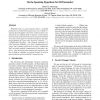Free Online Productivity Tools
i2Speak
i2Symbol
i2OCR
iTex2Img
iWeb2Print
iWeb2Shot
i2Type
iPdf2Split
iPdf2Merge
i2Bopomofo
i2Arabic
i2Style
i2Image
i2PDF
iLatex2Rtf
Sci2ools
HICSS
1999
IEEE
1999
IEEE
On the Spanning Hypothesis for EDI Semantics
What EDI needs is a good semantics, that is, a workable formal theory of what EDI messages mean. As is widely recognized, the point applies to electronic commerce and to communications by artificial agents in general. Some progress has been made in this direction, but very much work remains to be done. In this paper we introduce and discuss the spanning hypothesis for agent (EDI, electronic commerce, . . . ) communication languages. The spanning hypothesis is a claim about the semantics for a given communication language, and we think it represents a necessary condition for truly successful artificial communication in electronic commerce. After discussing and clarifying the hypothesis, and how it might be confirmed, we present evidence in its favor from an analysis of several EDIFACT transaction sets.
| Added | 03 Aug 2010 |
| Updated | 03 Aug 2010 |
| Type | Conference |
| Year | 1999 |
| Where | HICSS |
| Authors | Steven O. Kimbrough, Scott A. Moore |
Comments (0)

